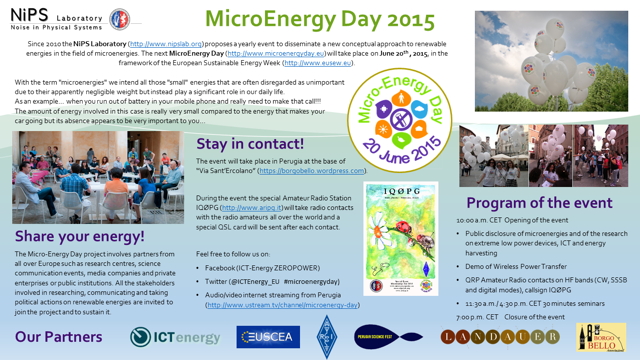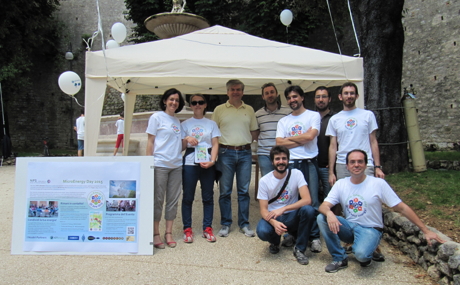
Discover smart solutions for mobile electronic energy needs.
Institutions from across Europe will be celebrating Micro-Energy Dayduring this week, to raise awareness about energy use in mobile electronic devices.
Coordinated by the NiPS Laboratory (www.nipslab.org) at University of Perugia and partners in the EU funded “ICT-Energy project” (www.ict-energy.eu) as part of European Sustainable Energy Week, this year’s Micro Energy Day will include several demonstrations in different European countries.
In Perugia the dissemination activity will make use of several demonstrative devices: from crystal radios, which can operate without power sources apart from the collected signals, to small radios operated by solar cells or thermoelectric generators, to wireless energy transmitters. Together with the NiPS group, the local amateur radio community and representatives of the Perugia Electronic Engineering Department will discuss with the local audience and with the amateur community all around the world the relevance of the scientific research on microenergies.

Moreover, Barcelona Supercomputing Center will host a Live Twitter Chat #LessEnergyICT!, focused on the energy expenditures in Information and Comunication Technology (from small computing devices to the exascale supercomputers), while, discussing with local visitors to the MareNostrum supercomputer energy issues and the solutions proposed to solve them.
In Cork (IR) the Tyndal Institute organizes 1 hour-duration workshop events, where a team of researchers meets with two primary schools 4th to 6th class.
‘The Micro-Energy Day, proposed since 2010 by our laboratory to disseminate a new conceptual approach to renewable energies at microscales, has grown, involving a larger number of partners all over Europe and reaching students, families as well as politicians and media. An enjoyable event, such as a science cafè or a foot race in the park, is the occasion to grab the attention of the audience and start a process of exploration of the microenergy world, commented Silvia Lombardi on behalf of the Noise in Physical Systems Laboratory at the University of Perugia, the institution coordinator of ICT-Energy.
According to the International Energy Agency, consumer electronics and computer equipment represent 15% of global residential electricity consumption – and this figure is set to triple if energy efficiency is not improved. Micro-Energy Day seeks to highlight this issue and showcase projects under the ICT Energy umbrella.
Further information is available on the Micro-Energy Day website (http://microenergyday.eu/) and ICT Energy website (http://www.ict-energy.eu).
